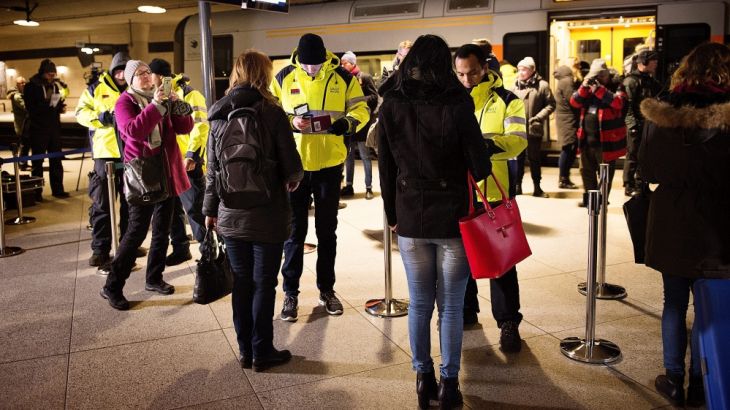Refugees look to the sea as Sweden tightens land border
Those wanting to join relatives in Sweden are taking dangerous sea routes into the country from Denmark.

Of all the European countries affected by the refugee crisis, perhaps Sweden is the most conflicted. This country, after all, refused to have anything to do with the 2003 Iraq war but then took in thousands of the refugees it caused.
![Police organise lines of refugees arriving from Denmark in Malmo, Sweden [Reuters]](/wp-content/uploads/2015/11/5e68100a3f814e7383b0bb9e15f2068e_18.jpeg)
And many of those people, who have been settled in Sweden for a decade, must desperately want to see family members who did not get out then but who have been part of the current exodus.
In the migrant reception centre in Malmo they explain that towards the end of last year, 10,000 people a day were trying to register. They were completely swamped. They were getting 100 media inquiries a day as well. The notion of Sweden being so welcoming became overwhelming, and the country’s resources could not cope.
Keep reading
list of 4 itemsWhy Egypt backed South Africa’s genocide case against Israel in the ICJ
US sanctions two RSF commanders as fighting escalates in Sudan’s Darfur
The Lost Souls of Syria – Part 1
Consequently, on January 4, the country did the very last thing it wanted to – it reintroduced border controls with Denmark for the first time since the 1950s. It meant that people crossing the famous Oresund bridge linking Copenhagen in Denmark to Malmo in Sweden would face passport checks. It became a sort of “death of Schengen” moment in Scandinavia.
One week into the controls and the migrant reception centre had received 1,000 people, so clearly it was stemming the flow. But some are still getting across, either because they have the correct papers or because they are being smuggled in car boots. But a third way has opened up too – a new and unbelievably hazardous sea route.
Last Sunday, the Swedish police confirmed that they had made an arrest after an inflatable RIB, a big dinghy of the sort used between Turkey and Greece, had come ashore on the Swedish side of the Oresund strait. If it had capsized it would have meant almost certain death in the freezing waters.

Consequently the Swedish coastguard, which has had a ship on patrol in the Mediterranean, is now on high alert and having to police its own waters. They find this enormously strange and wonder if they will meet the same people they came across thousands of kilometres south.
‘Criminals’
Equally, Danish activists who own yachts and who think it enormously unfair that refugees wanting to see their families in Sweden are blocked from doing so have begun smuggling them across. I understand that they have taken many dozens. It is not only far safer than a RIB but it is also free of charge, which the activists say makes a description of their work less to do with smuggling and more about mercy missions.
That said, in Denmark the right wing sees them as criminals. The Danish People’s Party wants them arrested. It sees no comparison between Denmark’s history, when fishermen smuggled Jews out of Nazi-occupied Copenhagen to Sweden, and the present day in which people fleeing groups such as ISIL are transported to be with pre-existing family members in Malmo or elsewhere.
Both Denmark and Sweden have extended their short-term border controls and there is every chance of them continuing. If the activists have to stop their operations for fear of arrest, then it is perfectly possible paid-for smuggling operations could take their place. The Swedish coastguard really hopes not, for they know just how desperate a journey that would be.